Soloni Oil: Change Management, Resistance, and Ethical Considerations
VerifiedAdded on 2023/04/23
|12
|3923
|364
Report
AI Summary
This report analyzes Soloni Oil's change management strategies as it expands its business, particularly focusing on the challenges of transitioning to virtual teams and the resistance encountered from the Nigerian team. It identifies driving and restraining forces for change, applies Kotter's eight-step model to manage the transition, and explores the reasons behind the Nigerian team's resistance. The report also delves into whether this resistance can be viewed as ethical and provides an explanation of "Individualistic and Macho" culture. Furthermore, the analysis considers PESTLE factors affecting Soloni Oil's expansion, emphasizing the need for effective communication, trust-building, and addressing fears of change to successfully implement organizational changes and achieve its objectives, including reducing carbon dioxide emissions.
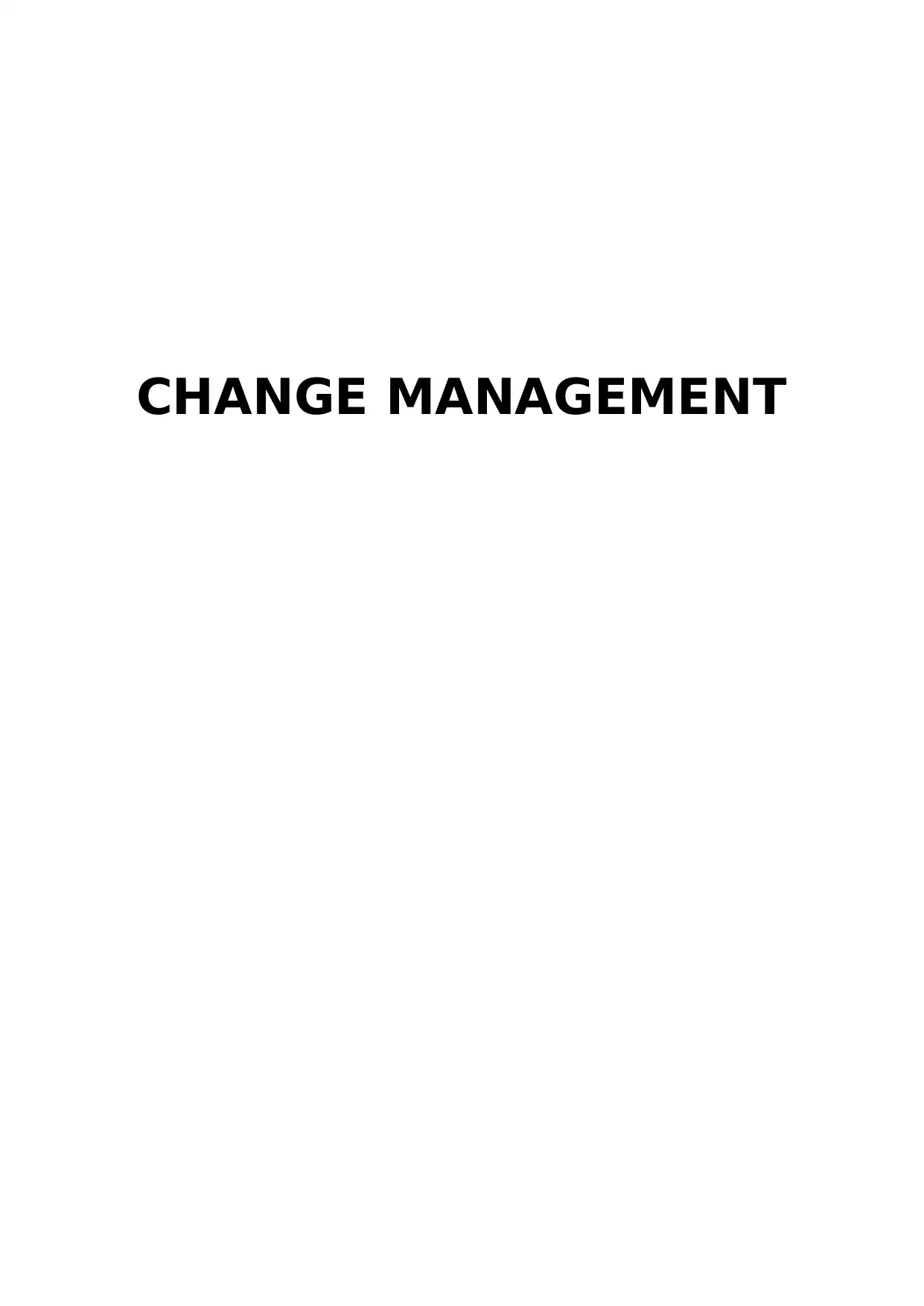
CHANGE MANAGEMENT
Paraphrase This Document
Need a fresh take? Get an instant paraphrase of this document with our AI Paraphraser
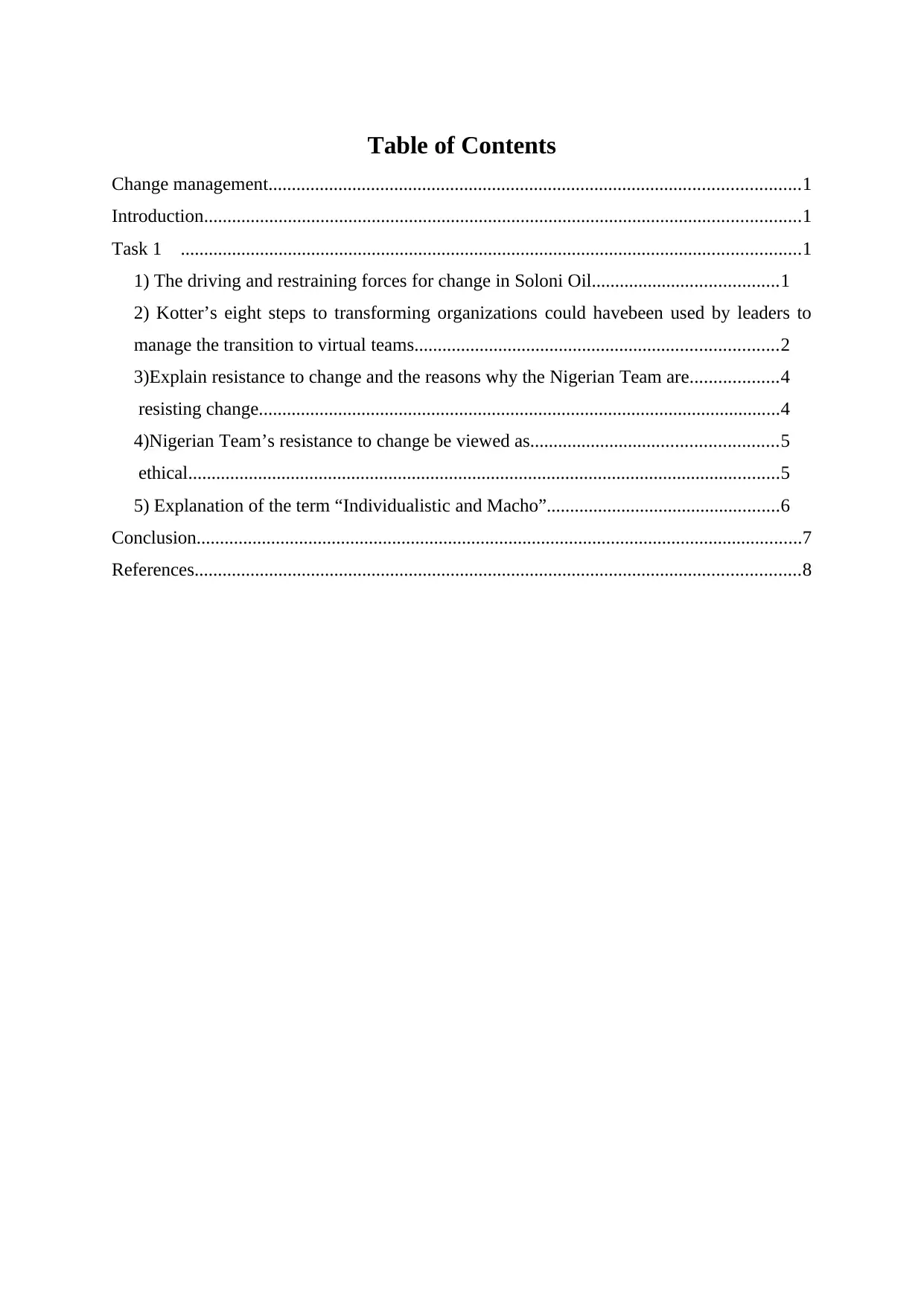
Table of Contents
Change management..................................................................................................................1
Introduction................................................................................................................................1
Task 1 .....................................................................................................................................1
1) The driving and restraining forces for change in Soloni Oil........................................1
2) Kotter’s eight steps to transforming organizations could havebeen used by leaders to
manage the transition to virtual teams..............................................................................2
3)Explain resistance to change and the reasons why the Nigerian Team are...................4
resisting change................................................................................................................4
4)Nigerian Team’s resistance to change be viewed as.....................................................5
ethical...............................................................................................................................5
5) Explanation of the term “Individualistic and Macho”..................................................6
Conclusion..................................................................................................................................7
References..................................................................................................................................8
Change management..................................................................................................................1
Introduction................................................................................................................................1
Task 1 .....................................................................................................................................1
1) The driving and restraining forces for change in Soloni Oil........................................1
2) Kotter’s eight steps to transforming organizations could havebeen used by leaders to
manage the transition to virtual teams..............................................................................2
3)Explain resistance to change and the reasons why the Nigerian Team are...................4
resisting change................................................................................................................4
4)Nigerian Team’s resistance to change be viewed as.....................................................5
ethical...............................................................................................................................5
5) Explanation of the term “Individualistic and Macho”..................................................6
Conclusion..................................................................................................................................7
References..................................................................................................................................8
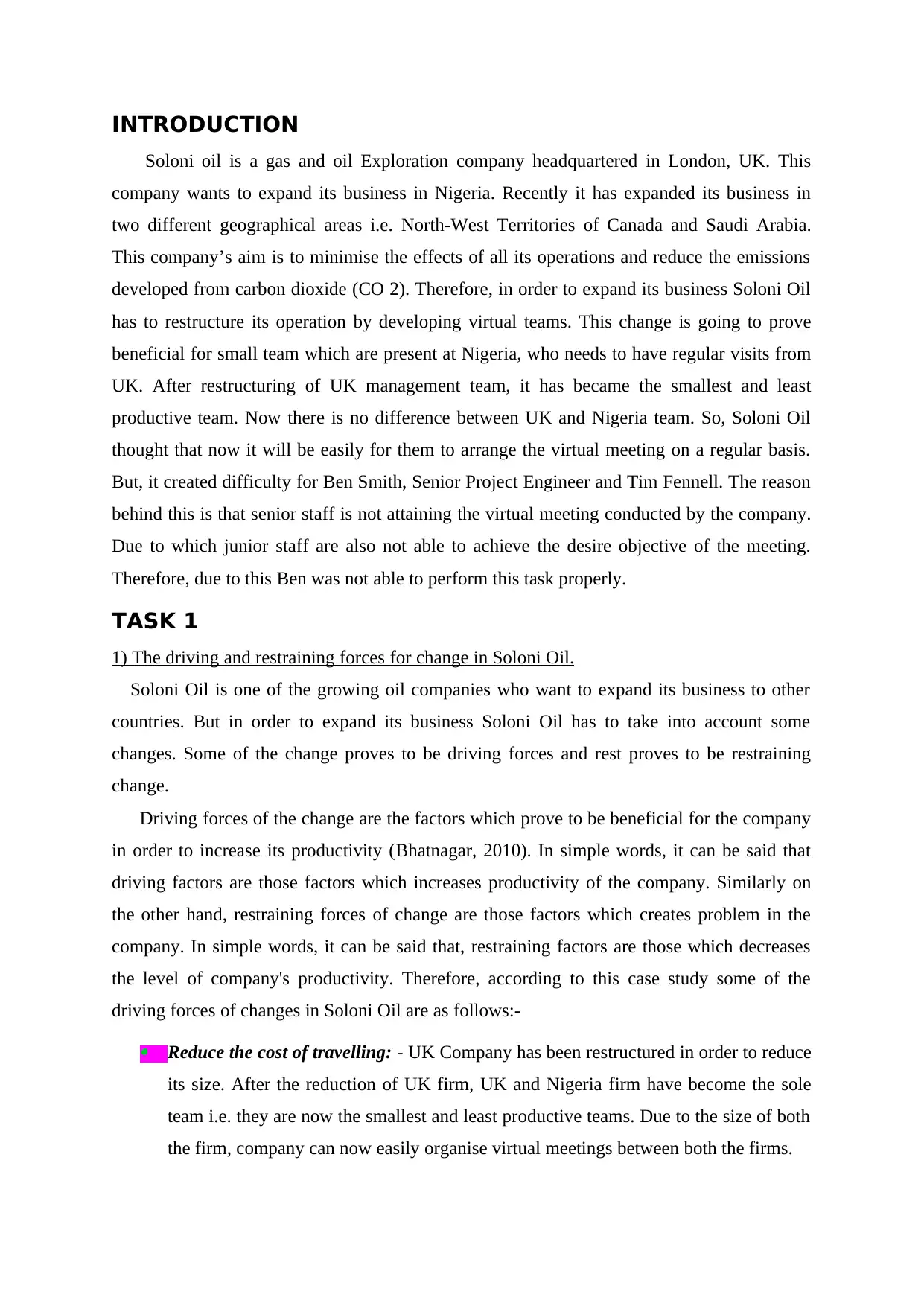
INTRODUCTION
Soloni oil is a gas and oil Exploration company headquartered in London, UK. This
company wants to expand its business in Nigeria. Recently it has expanded its business in
two different geographical areas i.e. North-West Territories of Canada and Saudi Arabia.
This company’s aim is to minimise the effects of all its operations and reduce the emissions
developed from carbon dioxide (CO 2). Therefore, in order to expand its business Soloni Oil
has to restructure its operation by developing virtual teams. This change is going to prove
beneficial for small team which are present at Nigeria, who needs to have regular visits from
UK. After restructuring of UK management team, it has became the smallest and least
productive team. Now there is no difference between UK and Nigeria team. So, Soloni Oil
thought that now it will be easily for them to arrange the virtual meeting on a regular basis.
But, it created difficulty for Ben Smith, Senior Project Engineer and Tim Fennell. The reason
behind this is that senior staff is not attaining the virtual meeting conducted by the company.
Due to which junior staff are also not able to achieve the desire objective of the meeting.
Therefore, due to this Ben was not able to perform this task properly.
TASK 1
1) The driving and restraining forces for change in Soloni Oil.
Soloni Oil is one of the growing oil companies who want to expand its business to other
countries. But in order to expand its business Soloni Oil has to take into account some
changes. Some of the change proves to be driving forces and rest proves to be restraining
change.
Driving forces of the change are the factors which prove to be beneficial for the company
in order to increase its productivity (Bhatnagar, 2010). In simple words, it can be said that
driving factors are those factors which increases productivity of the company. Similarly on
the other hand, restraining forces of change are those factors which creates problem in the
company. In simple words, it can be said that, restraining factors are those which decreases
the level of company's productivity. Therefore, according to this case study some of the
driving forces of changes in Soloni Oil are as follows:- Reduce the cost of travelling: - UK Company has been restructured in order to reduce
its size. After the reduction of UK firm, UK and Nigeria firm have become the sole
team i.e. they are now the smallest and least productive teams. Due to the size of both
the firm, company can now easily organise virtual meetings between both the firms.
Soloni oil is a gas and oil Exploration company headquartered in London, UK. This
company wants to expand its business in Nigeria. Recently it has expanded its business in
two different geographical areas i.e. North-West Territories of Canada and Saudi Arabia.
This company’s aim is to minimise the effects of all its operations and reduce the emissions
developed from carbon dioxide (CO 2). Therefore, in order to expand its business Soloni Oil
has to restructure its operation by developing virtual teams. This change is going to prove
beneficial for small team which are present at Nigeria, who needs to have regular visits from
UK. After restructuring of UK management team, it has became the smallest and least
productive team. Now there is no difference between UK and Nigeria team. So, Soloni Oil
thought that now it will be easily for them to arrange the virtual meeting on a regular basis.
But, it created difficulty for Ben Smith, Senior Project Engineer and Tim Fennell. The reason
behind this is that senior staff is not attaining the virtual meeting conducted by the company.
Due to which junior staff are also not able to achieve the desire objective of the meeting.
Therefore, due to this Ben was not able to perform this task properly.
TASK 1
1) The driving and restraining forces for change in Soloni Oil.
Soloni Oil is one of the growing oil companies who want to expand its business to other
countries. But in order to expand its business Soloni Oil has to take into account some
changes. Some of the change proves to be driving forces and rest proves to be restraining
change.
Driving forces of the change are the factors which prove to be beneficial for the company
in order to increase its productivity (Bhatnagar, 2010). In simple words, it can be said that
driving factors are those factors which increases productivity of the company. Similarly on
the other hand, restraining forces of change are those factors which creates problem in the
company. In simple words, it can be said that, restraining factors are those which decreases
the level of company's productivity. Therefore, according to this case study some of the
driving forces of changes in Soloni Oil are as follows:- Reduce the cost of travelling: - UK Company has been restructured in order to reduce
its size. After the reduction of UK firm, UK and Nigeria firm have become the sole
team i.e. they are now the smallest and least productive teams. Due to the size of both
the firm, company can now easily organise virtual meetings between both the firms.
⊘ This is a preview!⊘
Do you want full access?
Subscribe today to unlock all pages.

Trusted by 1+ million students worldwide
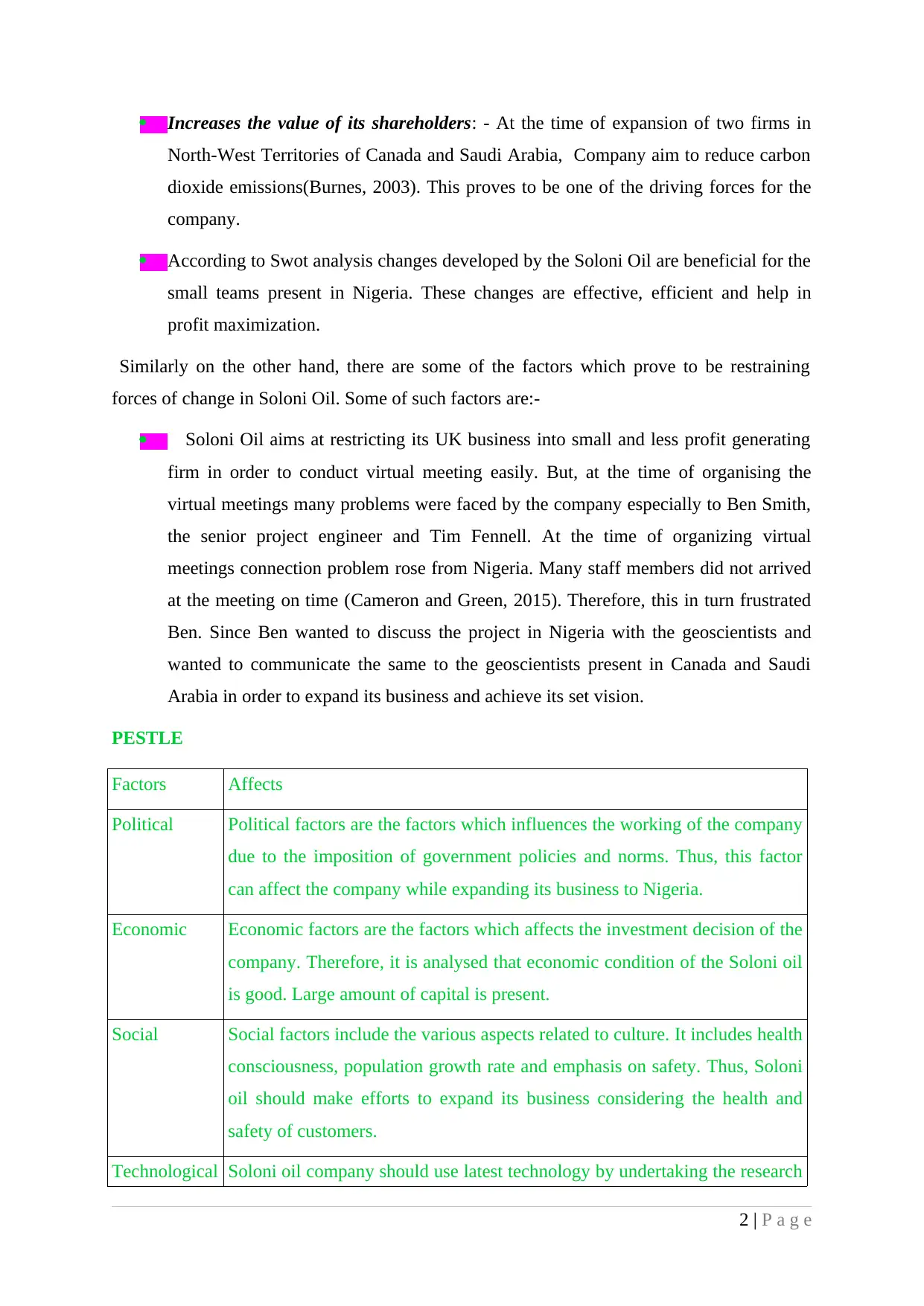
Increases the value of its shareholders: - At the time of expansion of two firms in
North-West Territories of Canada and Saudi Arabia, Company aim to reduce carbon
dioxide emissions(Burnes, 2003). This proves to be one of the driving forces for the
company.
According to Swot analysis changes developed by the Soloni Oil are beneficial for the
small teams present in Nigeria. These changes are effective, efficient and help in
profit maximization.
Similarly on the other hand, there are some of the factors which prove to be restraining
forces of change in Soloni Oil. Some of such factors are:-
Soloni Oil aims at restricting its UK business into small and less profit generating
firm in order to conduct virtual meeting easily. But, at the time of organising the
virtual meetings many problems were faced by the company especially to Ben Smith,
the senior project engineer and Tim Fennell. At the time of organizing virtual
meetings connection problem rose from Nigeria. Many staff members did not arrived
at the meeting on time (Cameron and Green, 2015). Therefore, this in turn frustrated
Ben. Since Ben wanted to discuss the project in Nigeria with the geoscientists and
wanted to communicate the same to the geoscientists present in Canada and Saudi
Arabia in order to expand its business and achieve its set vision.
PESTLE
Factors Affects
Political Political factors are the factors which influences the working of the company
due to the imposition of government policies and norms. Thus, this factor
can affect the company while expanding its business to Nigeria.
Economic Economic factors are the factors which affects the investment decision of the
company. Therefore, it is analysed that economic condition of the Soloni oil
is good. Large amount of capital is present.
Social Social factors include the various aspects related to culture. It includes health
consciousness, population growth rate and emphasis on safety. Thus, Soloni
oil should make efforts to expand its business considering the health and
safety of customers.
Technological Soloni oil company should use latest technology by undertaking the research
2 | P a g e
North-West Territories of Canada and Saudi Arabia, Company aim to reduce carbon
dioxide emissions(Burnes, 2003). This proves to be one of the driving forces for the
company.
According to Swot analysis changes developed by the Soloni Oil are beneficial for the
small teams present in Nigeria. These changes are effective, efficient and help in
profit maximization.
Similarly on the other hand, there are some of the factors which prove to be restraining
forces of change in Soloni Oil. Some of such factors are:-
Soloni Oil aims at restricting its UK business into small and less profit generating
firm in order to conduct virtual meeting easily. But, at the time of organising the
virtual meetings many problems were faced by the company especially to Ben Smith,
the senior project engineer and Tim Fennell. At the time of organizing virtual
meetings connection problem rose from Nigeria. Many staff members did not arrived
at the meeting on time (Cameron and Green, 2015). Therefore, this in turn frustrated
Ben. Since Ben wanted to discuss the project in Nigeria with the geoscientists and
wanted to communicate the same to the geoscientists present in Canada and Saudi
Arabia in order to expand its business and achieve its set vision.
PESTLE
Factors Affects
Political Political factors are the factors which influences the working of the company
due to the imposition of government policies and norms. Thus, this factor
can affect the company while expanding its business to Nigeria.
Economic Economic factors are the factors which affects the investment decision of the
company. Therefore, it is analysed that economic condition of the Soloni oil
is good. Large amount of capital is present.
Social Social factors include the various aspects related to culture. It includes health
consciousness, population growth rate and emphasis on safety. Thus, Soloni
oil should make efforts to expand its business considering the health and
safety of customers.
Technological Soloni oil company should use latest technology by undertaking the research
2 | P a g e
Paraphrase This Document
Need a fresh take? Get an instant paraphrase of this document with our AI Paraphraser
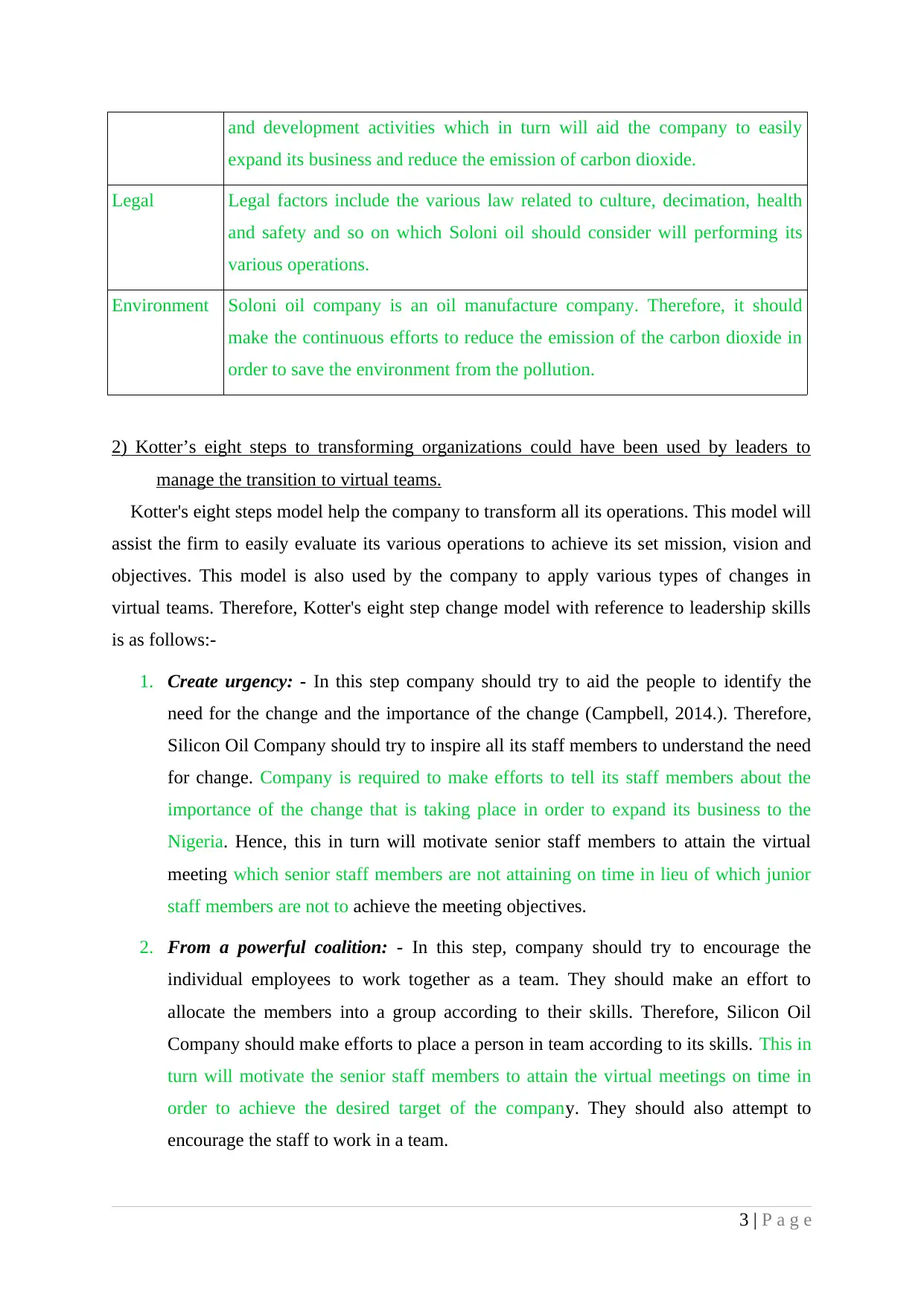
and development activities which in turn will aid the company to easily
expand its business and reduce the emission of carbon dioxide.
Legal Legal factors include the various law related to culture, decimation, health
and safety and so on which Soloni oil should consider will performing its
various operations.
Environment Soloni oil company is an oil manufacture company. Therefore, it should
make the continuous efforts to reduce the emission of the carbon dioxide in
order to save the environment from the pollution.
2) Kotter’s eight steps to transforming organizations could have been used by leaders to
manage the transition to virtual teams.
Kotter's eight steps model help the company to transform all its operations. This model will
assist the firm to easily evaluate its various operations to achieve its set mission, vision and
objectives. This model is also used by the company to apply various types of changes in
virtual teams. Therefore, Kotter's eight step change model with reference to leadership skills
is as follows:-
1. Create urgency: - In this step company should try to aid the people to identify the
need for the change and the importance of the change (Campbell, 2014.). Therefore,
Silicon Oil Company should try to inspire all its staff members to understand the need
for change. Company is required to make efforts to tell its staff members about the
importance of the change that is taking place in order to expand its business to the
Nigeria. Hence, this in turn will motivate senior staff members to attain the virtual
meeting which senior staff members are not attaining on time in lieu of which junior
staff members are not to achieve the meeting objectives.
2. From a powerful coalition: - In this step, company should try to encourage the
individual employees to work together as a team. They should make an effort to
allocate the members into a group according to their skills. Therefore, Silicon Oil
Company should make efforts to place a person in team according to its skills. This in
turn will motivate the senior staff members to attain the virtual meetings on time in
order to achieve the desired target of the company. They should also attempt to
encourage the staff to work in a team.
3 | P a g e
expand its business and reduce the emission of carbon dioxide.
Legal Legal factors include the various law related to culture, decimation, health
and safety and so on which Soloni oil should consider will performing its
various operations.
Environment Soloni oil company is an oil manufacture company. Therefore, it should
make the continuous efforts to reduce the emission of the carbon dioxide in
order to save the environment from the pollution.
2) Kotter’s eight steps to transforming organizations could have been used by leaders to
manage the transition to virtual teams.
Kotter's eight steps model help the company to transform all its operations. This model will
assist the firm to easily evaluate its various operations to achieve its set mission, vision and
objectives. This model is also used by the company to apply various types of changes in
virtual teams. Therefore, Kotter's eight step change model with reference to leadership skills
is as follows:-
1. Create urgency: - In this step company should try to aid the people to identify the
need for the change and the importance of the change (Campbell, 2014.). Therefore,
Silicon Oil Company should try to inspire all its staff members to understand the need
for change. Company is required to make efforts to tell its staff members about the
importance of the change that is taking place in order to expand its business to the
Nigeria. Hence, this in turn will motivate senior staff members to attain the virtual
meeting which senior staff members are not attaining on time in lieu of which junior
staff members are not to achieve the meeting objectives.
2. From a powerful coalition: - In this step, company should try to encourage the
individual employees to work together as a team. They should make an effort to
allocate the members into a group according to their skills. Therefore, Silicon Oil
Company should make efforts to place a person in team according to its skills. This in
turn will motivate the senior staff members to attain the virtual meetings on time in
order to achieve the desired target of the company. They should also attempt to
encourage the staff to work in a team.
3 | P a g e
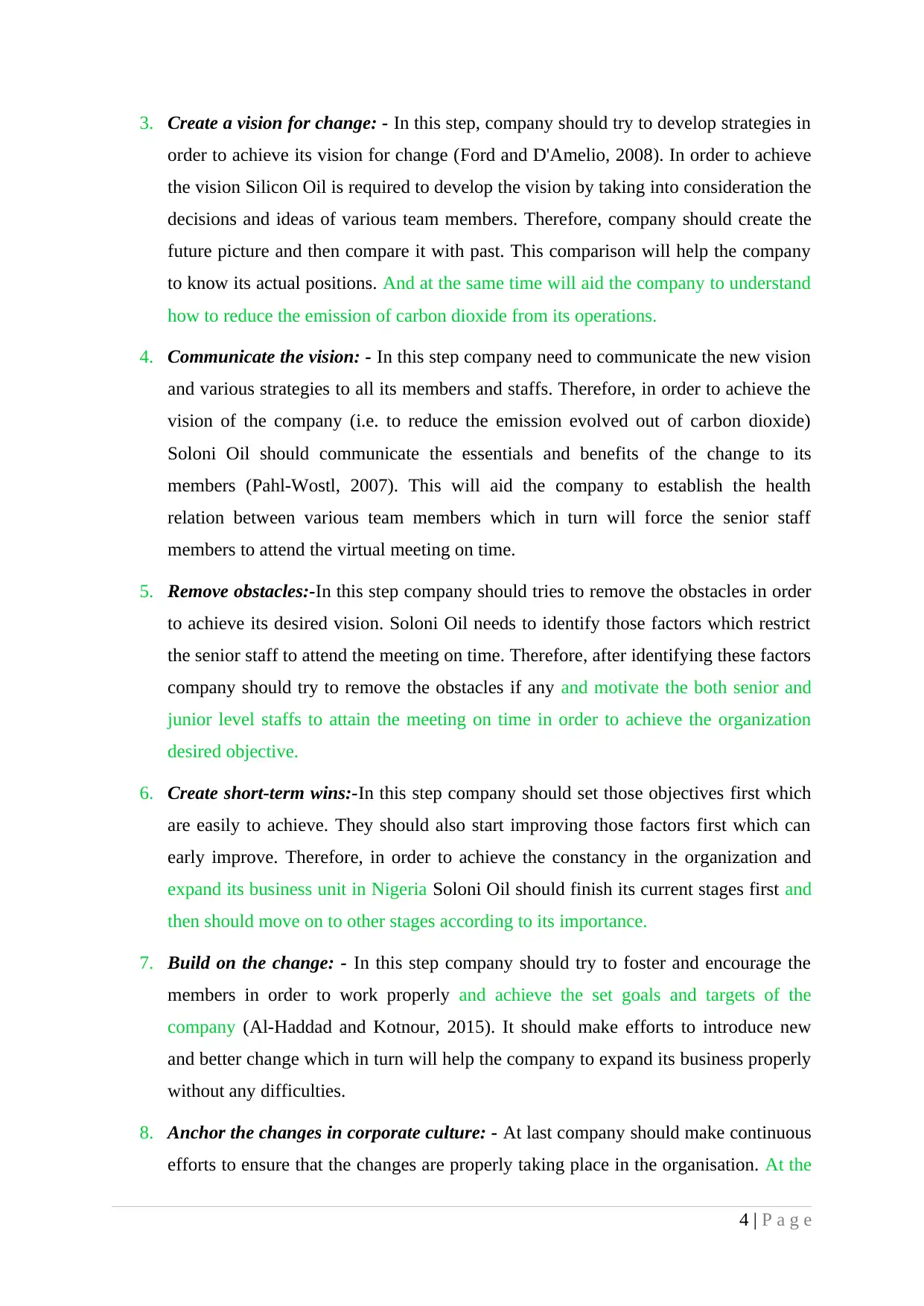
3. Create a vision for change: - In this step, company should try to develop strategies in
order to achieve its vision for change (Ford and D'Amelio, 2008). In order to achieve
the vision Silicon Oil is required to develop the vision by taking into consideration the
decisions and ideas of various team members. Therefore, company should create the
future picture and then compare it with past. This comparison will help the company
to know its actual positions. And at the same time will aid the company to understand
how to reduce the emission of carbon dioxide from its operations.
4. Communicate the vision: - In this step company need to communicate the new vision
and various strategies to all its members and staffs. Therefore, in order to achieve the
vision of the company (i.e. to reduce the emission evolved out of carbon dioxide)
Soloni Oil should communicate the essentials and benefits of the change to its
members (Pahl-Wostl, 2007). This will aid the company to establish the health
relation between various team members which in turn will force the senior staff
members to attend the virtual meeting on time.
5. Remove obstacles:-In this step company should tries to remove the obstacles in order
to achieve its desired vision. Soloni Oil needs to identify those factors which restrict
the senior staff to attend the meeting on time. Therefore, after identifying these factors
company should try to remove the obstacles if any and motivate the both senior and
junior level staffs to attain the meeting on time in order to achieve the organization
desired objective.
6. Create short-term wins:-In this step company should set those objectives first which
are easily to achieve. They should also start improving those factors first which can
early improve. Therefore, in order to achieve the constancy in the organization and
expand its business unit in Nigeria Soloni Oil should finish its current stages first and
then should move on to other stages according to its importance.
7. Build on the change: - In this step company should try to foster and encourage the
members in order to work properly and achieve the set goals and targets of the
company (Al-Haddad and Kotnour, 2015). It should make efforts to introduce new
and better change which in turn will help the company to expand its business properly
without any difficulties.
8. Anchor the changes in corporate culture: - At last company should make continuous
efforts to ensure that the changes are properly taking place in the organisation. At the
4 | P a g e
order to achieve its vision for change (Ford and D'Amelio, 2008). In order to achieve
the vision Silicon Oil is required to develop the vision by taking into consideration the
decisions and ideas of various team members. Therefore, company should create the
future picture and then compare it with past. This comparison will help the company
to know its actual positions. And at the same time will aid the company to understand
how to reduce the emission of carbon dioxide from its operations.
4. Communicate the vision: - In this step company need to communicate the new vision
and various strategies to all its members and staffs. Therefore, in order to achieve the
vision of the company (i.e. to reduce the emission evolved out of carbon dioxide)
Soloni Oil should communicate the essentials and benefits of the change to its
members (Pahl-Wostl, 2007). This will aid the company to establish the health
relation between various team members which in turn will force the senior staff
members to attend the virtual meeting on time.
5. Remove obstacles:-In this step company should tries to remove the obstacles in order
to achieve its desired vision. Soloni Oil needs to identify those factors which restrict
the senior staff to attend the meeting on time. Therefore, after identifying these factors
company should try to remove the obstacles if any and motivate the both senior and
junior level staffs to attain the meeting on time in order to achieve the organization
desired objective.
6. Create short-term wins:-In this step company should set those objectives first which
are easily to achieve. They should also start improving those factors first which can
early improve. Therefore, in order to achieve the constancy in the organization and
expand its business unit in Nigeria Soloni Oil should finish its current stages first and
then should move on to other stages according to its importance.
7. Build on the change: - In this step company should try to foster and encourage the
members in order to work properly and achieve the set goals and targets of the
company (Al-Haddad and Kotnour, 2015). It should make efforts to introduce new
and better change which in turn will help the company to expand its business properly
without any difficulties.
8. Anchor the changes in corporate culture: - At last company should make continuous
efforts to ensure that the changes are properly taking place in the organisation. At the
4 | P a g e
⊘ This is a preview!⊘
Do you want full access?
Subscribe today to unlock all pages.

Trusted by 1+ million students worldwide
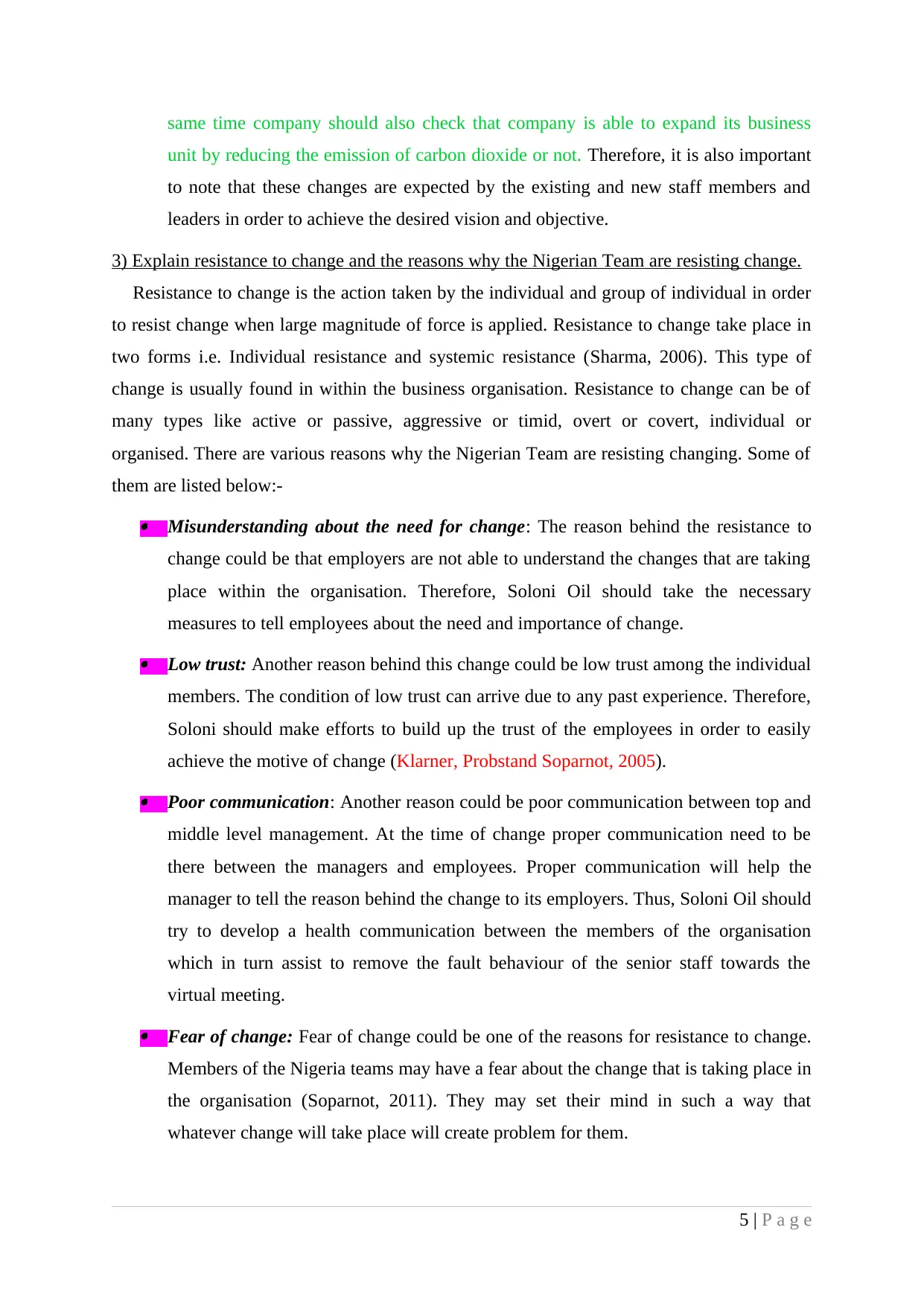
same time company should also check that company is able to expand its business
unit by reducing the emission of carbon dioxide or not. Therefore, it is also important
to note that these changes are expected by the existing and new staff members and
leaders in order to achieve the desired vision and objective.
3) Explain resistance to change and the reasons why the Nigerian Team are resisting change.
Resistance to change is the action taken by the individual and group of individual in order
to resist change when large magnitude of force is applied. Resistance to change take place in
two forms i.e. Individual resistance and systemic resistance (Sharma, 2006). This type of
change is usually found in within the business organisation. Resistance to change can be of
many types like active or passive, aggressive or timid, overt or covert, individual or
organised. There are various reasons why the Nigerian Team are resisting changing. Some of
them are listed below:- Misunderstanding about the need for change: The reason behind the resistance to
change could be that employers are not able to understand the changes that are taking
place within the organisation. Therefore, Soloni Oil should take the necessary
measures to tell employees about the need and importance of change. Low trust: Another reason behind this change could be low trust among the individual
members. The condition of low trust can arrive due to any past experience. Therefore,
Soloni should make efforts to build up the trust of the employees in order to easily
achieve the motive of change (Klarner, Probstand Soparnot, 2005). Poor communication: Another reason could be poor communication between top and
middle level management. At the time of change proper communication need to be
there between the managers and employees. Proper communication will help the
manager to tell the reason behind the change to its employers. Thus, Soloni Oil should
try to develop a health communication between the members of the organisation
which in turn assist to remove the fault behaviour of the senior staff towards the
virtual meeting. Fear of change: Fear of change could be one of the reasons for resistance to change.
Members of the Nigeria teams may have a fear about the change that is taking place in
the organisation (Soparnot, 2011). They may set their mind in such a way that
whatever change will take place will create problem for them.
5 | P a g e
unit by reducing the emission of carbon dioxide or not. Therefore, it is also important
to note that these changes are expected by the existing and new staff members and
leaders in order to achieve the desired vision and objective.
3) Explain resistance to change and the reasons why the Nigerian Team are resisting change.
Resistance to change is the action taken by the individual and group of individual in order
to resist change when large magnitude of force is applied. Resistance to change take place in
two forms i.e. Individual resistance and systemic resistance (Sharma, 2006). This type of
change is usually found in within the business organisation. Resistance to change can be of
many types like active or passive, aggressive or timid, overt or covert, individual or
organised. There are various reasons why the Nigerian Team are resisting changing. Some of
them are listed below:- Misunderstanding about the need for change: The reason behind the resistance to
change could be that employers are not able to understand the changes that are taking
place within the organisation. Therefore, Soloni Oil should take the necessary
measures to tell employees about the need and importance of change. Low trust: Another reason behind this change could be low trust among the individual
members. The condition of low trust can arrive due to any past experience. Therefore,
Soloni should make efforts to build up the trust of the employees in order to easily
achieve the motive of change (Klarner, Probstand Soparnot, 2005). Poor communication: Another reason could be poor communication between top and
middle level management. At the time of change proper communication need to be
there between the managers and employees. Proper communication will help the
manager to tell the reason behind the change to its employers. Thus, Soloni Oil should
try to develop a health communication between the members of the organisation
which in turn assist to remove the fault behaviour of the senior staff towards the
virtual meeting. Fear of change: Fear of change could be one of the reasons for resistance to change.
Members of the Nigeria teams may have a fear about the change that is taking place in
the organisation (Soparnot, 2011). They may set their mind in such a way that
whatever change will take place will create problem for them.
5 | P a g e
Paraphrase This Document
Need a fresh take? Get an instant paraphrase of this document with our AI Paraphraser
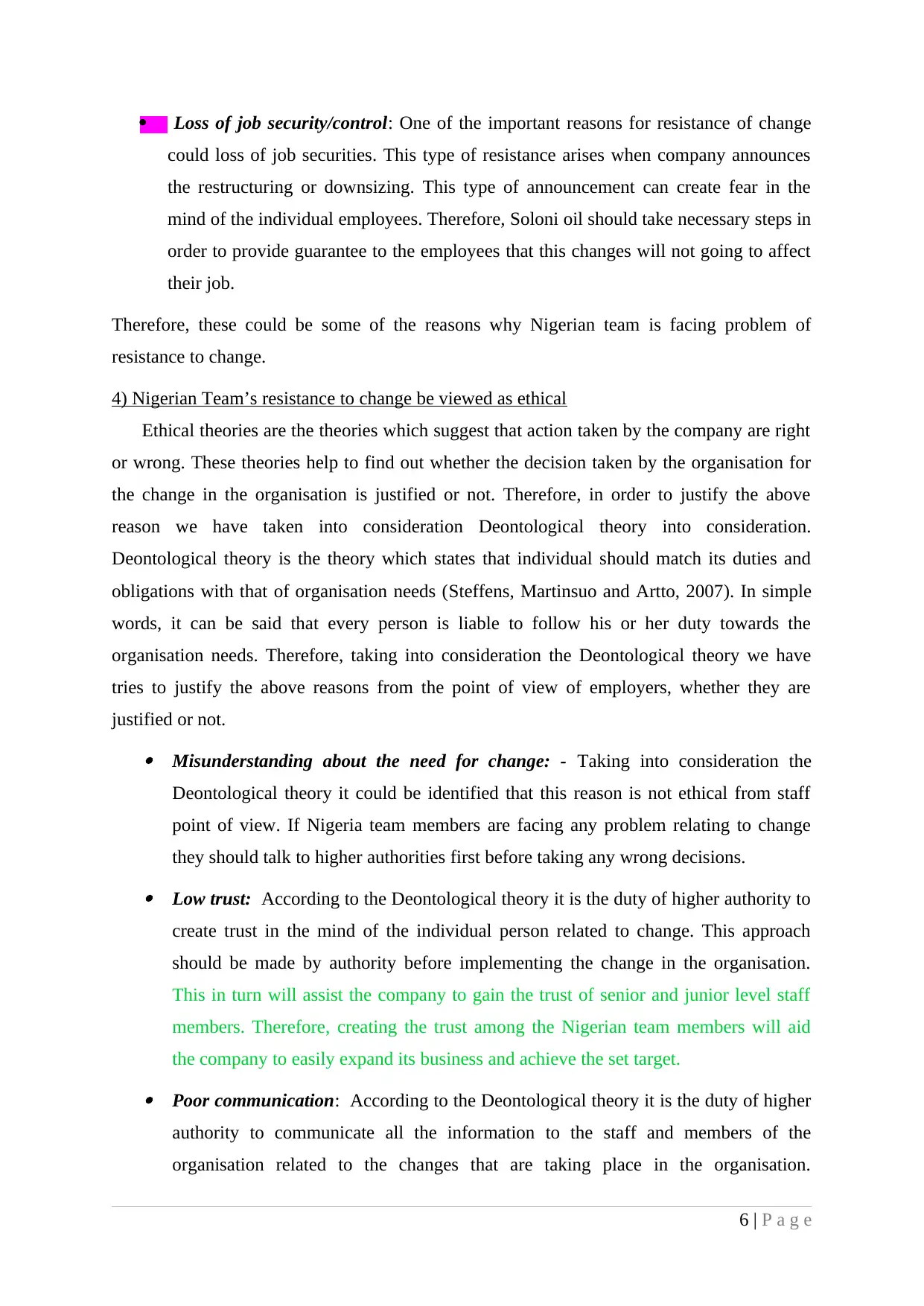
Loss of job security/control: One of the important reasons for resistance of change
could loss of job securities. This type of resistance arises when company announces
the restructuring or downsizing. This type of announcement can create fear in the
mind of the individual employees. Therefore, Soloni oil should take necessary steps in
order to provide guarantee to the employees that this changes will not going to affect
their job.
Therefore, these could be some of the reasons why Nigerian team is facing problem of
resistance to change.
4) Nigerian Team’s resistance to change be viewed as ethical
Ethical theories are the theories which suggest that action taken by the company are right
or wrong. These theories help to find out whether the decision taken by the organisation for
the change in the organisation is justified or not. Therefore, in order to justify the above
reason we have taken into consideration Deontological theory into consideration.
Deontological theory is the theory which states that individual should match its duties and
obligations with that of organisation needs (Steffens, Martinsuo and Artto, 2007). In simple
words, it can be said that every person is liable to follow his or her duty towards the
organisation needs. Therefore, taking into consideration the Deontological theory we have
tries to justify the above reasons from the point of view of employers, whether they are
justified or not. Misunderstanding about the need for change: - Taking into consideration the
Deontological theory it could be identified that this reason is not ethical from staff
point of view. If Nigeria team members are facing any problem relating to change
they should talk to higher authorities first before taking any wrong decisions. Low trust: According to the Deontological theory it is the duty of higher authority to
create trust in the mind of the individual person related to change. This approach
should be made by authority before implementing the change in the organisation.
This in turn will assist the company to gain the trust of senior and junior level staff
members. Therefore, creating the trust among the Nigerian team members will aid
the company to easily expand its business and achieve the set target. Poor communication: According to the Deontological theory it is the duty of higher
authority to communicate all the information to the staff and members of the
organisation related to the changes that are taking place in the organisation.
6 | P a g e
could loss of job securities. This type of resistance arises when company announces
the restructuring or downsizing. This type of announcement can create fear in the
mind of the individual employees. Therefore, Soloni oil should take necessary steps in
order to provide guarantee to the employees that this changes will not going to affect
their job.
Therefore, these could be some of the reasons why Nigerian team is facing problem of
resistance to change.
4) Nigerian Team’s resistance to change be viewed as ethical
Ethical theories are the theories which suggest that action taken by the company are right
or wrong. These theories help to find out whether the decision taken by the organisation for
the change in the organisation is justified or not. Therefore, in order to justify the above
reason we have taken into consideration Deontological theory into consideration.
Deontological theory is the theory which states that individual should match its duties and
obligations with that of organisation needs (Steffens, Martinsuo and Artto, 2007). In simple
words, it can be said that every person is liable to follow his or her duty towards the
organisation needs. Therefore, taking into consideration the Deontological theory we have
tries to justify the above reasons from the point of view of employers, whether they are
justified or not. Misunderstanding about the need for change: - Taking into consideration the
Deontological theory it could be identified that this reason is not ethical from staff
point of view. If Nigeria team members are facing any problem relating to change
they should talk to higher authorities first before taking any wrong decisions. Low trust: According to the Deontological theory it is the duty of higher authority to
create trust in the mind of the individual person related to change. This approach
should be made by authority before implementing the change in the organisation.
This in turn will assist the company to gain the trust of senior and junior level staff
members. Therefore, creating the trust among the Nigerian team members will aid
the company to easily expand its business and achieve the set target. Poor communication: According to the Deontological theory it is the duty of higher
authority to communicate all the information to the staff and members of the
organisation related to the changes that are taking place in the organisation.
6 | P a g e
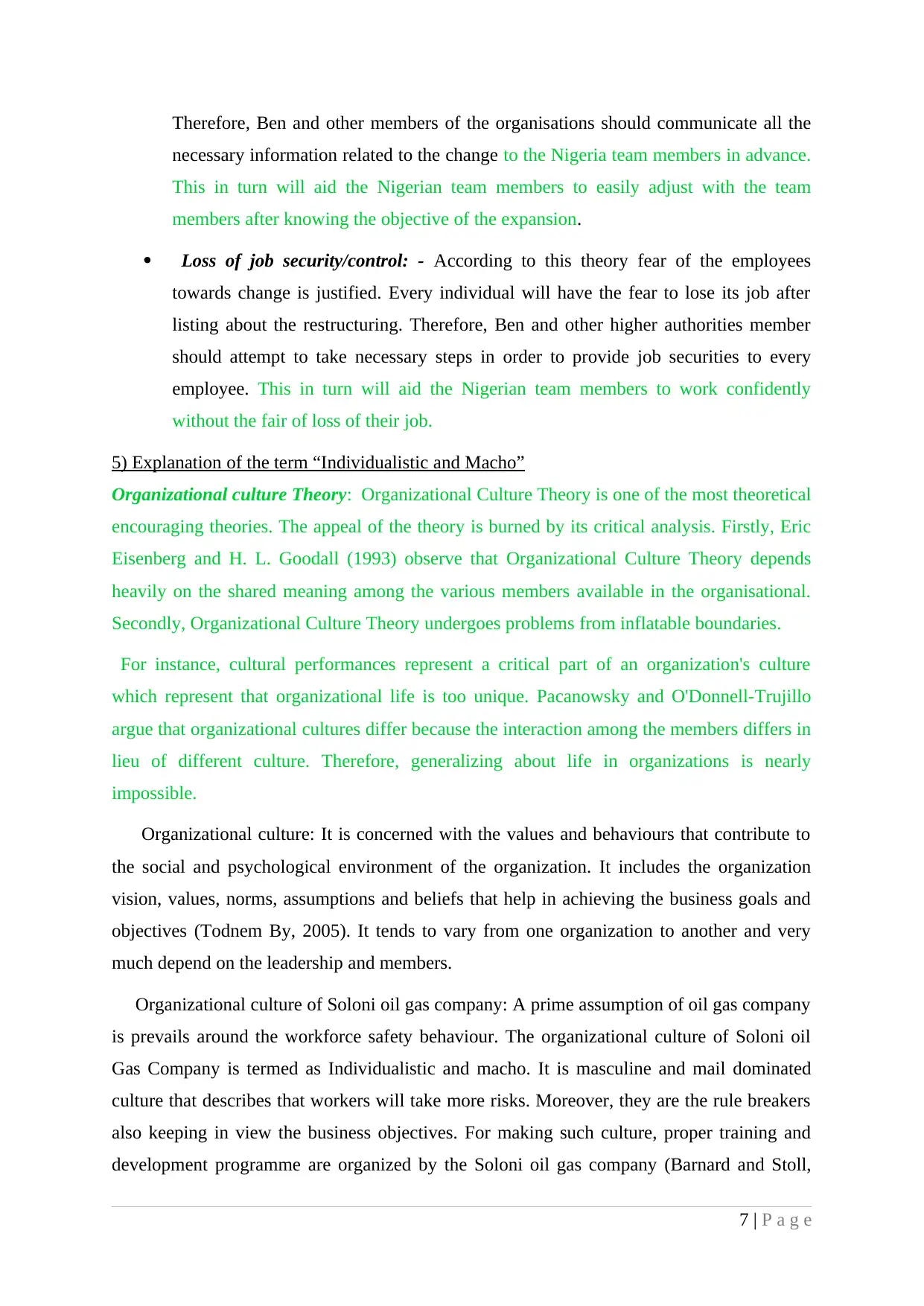
Therefore, Ben and other members of the organisations should communicate all the
necessary information related to the change to the Nigeria team members in advance.
This in turn will aid the Nigerian team members to easily adjust with the team
members after knowing the objective of the expansion.
Loss of job security/control: - According to this theory fear of the employees
towards change is justified. Every individual will have the fear to lose its job after
listing about the restructuring. Therefore, Ben and other higher authorities member
should attempt to take necessary steps in order to provide job securities to every
employee. This in turn will aid the Nigerian team members to work confidently
without the fair of loss of their job.
5) Explanation of the term “Individualistic and Macho”
Organizational culture Theory: Organizational Culture Theory is one of the most theoretical
encouraging theories. The appeal of the theory is burned by its critical analysis. Firstly, Eric
Eisenberg and H. L. Goodall (1993) observe that Organizational Culture Theory depends
heavily on the shared meaning among the various members available in the organisational.
Secondly, Organizational Culture Theory undergoes problems from inflatable boundaries.
For instance, cultural performances represent a critical part of an organization's culture
which represent that organizational life is too unique. Pacanowsky and O'Donnell-Trujillo
argue that organizational cultures differ because the interaction among the members differs in
lieu of different culture. Therefore, generalizing about life in organizations is nearly
impossible.
Organizational culture: It is concerned with the values and behaviours that contribute to
the social and psychological environment of the organization. It includes the organization
vision, values, norms, assumptions and beliefs that help in achieving the business goals and
objectives (Todnem By, 2005). It tends to vary from one organization to another and very
much depend on the leadership and members.
Organizational culture of Soloni oil gas company: A prime assumption of oil gas company
is prevails around the workforce safety behaviour. The organizational culture of Soloni oil
Gas Company is termed as Individualistic and macho. It is masculine and mail dominated
culture that describes that workers will take more risks. Moreover, they are the rule breakers
also keeping in view the business objectives. For making such culture, proper training and
development programme are organized by the Soloni oil gas company (Barnard and Stoll,
7 | P a g e
necessary information related to the change to the Nigeria team members in advance.
This in turn will aid the Nigerian team members to easily adjust with the team
members after knowing the objective of the expansion.
Loss of job security/control: - According to this theory fear of the employees
towards change is justified. Every individual will have the fear to lose its job after
listing about the restructuring. Therefore, Ben and other higher authorities member
should attempt to take necessary steps in order to provide job securities to every
employee. This in turn will aid the Nigerian team members to work confidently
without the fair of loss of their job.
5) Explanation of the term “Individualistic and Macho”
Organizational culture Theory: Organizational Culture Theory is one of the most theoretical
encouraging theories. The appeal of the theory is burned by its critical analysis. Firstly, Eric
Eisenberg and H. L. Goodall (1993) observe that Organizational Culture Theory depends
heavily on the shared meaning among the various members available in the organisational.
Secondly, Organizational Culture Theory undergoes problems from inflatable boundaries.
For instance, cultural performances represent a critical part of an organization's culture
which represent that organizational life is too unique. Pacanowsky and O'Donnell-Trujillo
argue that organizational cultures differ because the interaction among the members differs in
lieu of different culture. Therefore, generalizing about life in organizations is nearly
impossible.
Organizational culture: It is concerned with the values and behaviours that contribute to
the social and psychological environment of the organization. It includes the organization
vision, values, norms, assumptions and beliefs that help in achieving the business goals and
objectives (Todnem By, 2005). It tends to vary from one organization to another and very
much depend on the leadership and members.
Organizational culture of Soloni oil gas company: A prime assumption of oil gas company
is prevails around the workforce safety behaviour. The organizational culture of Soloni oil
Gas Company is termed as Individualistic and macho. It is masculine and mail dominated
culture that describes that workers will take more risks. Moreover, they are the rule breakers
also keeping in view the business objectives. For making such culture, proper training and
development programme are organized by the Soloni oil gas company (Barnard and Stoll,
7 | P a g e
⊘ This is a preview!⊘
Do you want full access?
Subscribe today to unlock all pages.

Trusted by 1+ million students worldwide
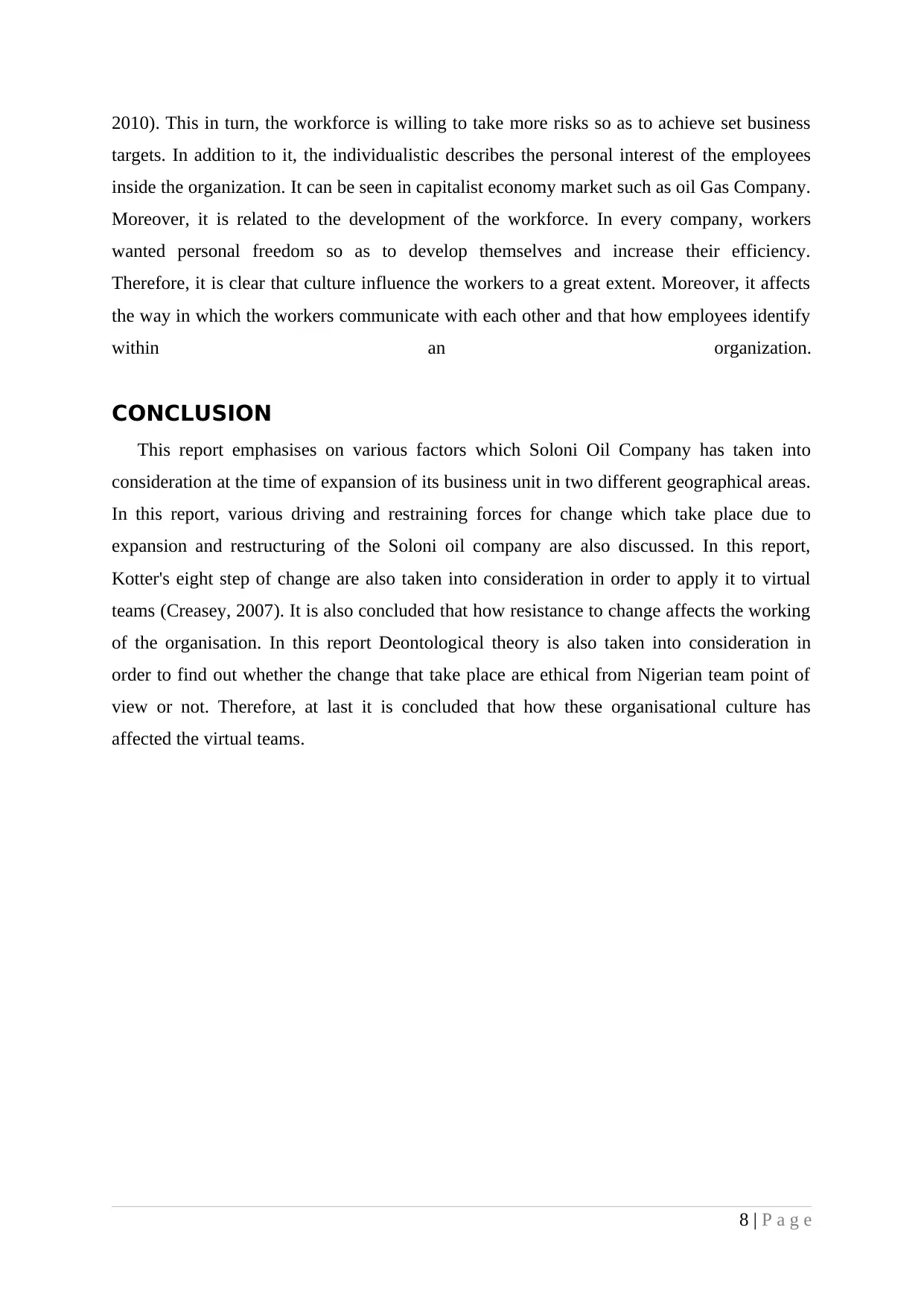
2010). This in turn, the workforce is willing to take more risks so as to achieve set business
targets. In addition to it, the individualistic describes the personal interest of the employees
inside the organization. It can be seen in capitalist economy market such as oil Gas Company.
Moreover, it is related to the development of the workforce. In every company, workers
wanted personal freedom so as to develop themselves and increase their efficiency.
Therefore, it is clear that culture influence the workers to a great extent. Moreover, it affects
the way in which the workers communicate with each other and that how employees identify
within an organization.
CONCLUSION
This report emphasises on various factors which Soloni Oil Company has taken into
consideration at the time of expansion of its business unit in two different geographical areas.
In this report, various driving and restraining forces for change which take place due to
expansion and restructuring of the Soloni oil company are also discussed. In this report,
Kotter's eight step of change are also taken into consideration in order to apply it to virtual
teams (Creasey, 2007). It is also concluded that how resistance to change affects the working
of the organisation. In this report Deontological theory is also taken into consideration in
order to find out whether the change that take place are ethical from Nigerian team point of
view or not. Therefore, at last it is concluded that how these organisational culture has
affected the virtual teams.
8 | P a g e
targets. In addition to it, the individualistic describes the personal interest of the employees
inside the organization. It can be seen in capitalist economy market such as oil Gas Company.
Moreover, it is related to the development of the workforce. In every company, workers
wanted personal freedom so as to develop themselves and increase their efficiency.
Therefore, it is clear that culture influence the workers to a great extent. Moreover, it affects
the way in which the workers communicate with each other and that how employees identify
within an organization.
CONCLUSION
This report emphasises on various factors which Soloni Oil Company has taken into
consideration at the time of expansion of its business unit in two different geographical areas.
In this report, various driving and restraining forces for change which take place due to
expansion and restructuring of the Soloni oil company are also discussed. In this report,
Kotter's eight step of change are also taken into consideration in order to apply it to virtual
teams (Creasey, 2007). It is also concluded that how resistance to change affects the working
of the organisation. In this report Deontological theory is also taken into consideration in
order to find out whether the change that take place are ethical from Nigerian team point of
view or not. Therefore, at last it is concluded that how these organisational culture has
affected the virtual teams.
8 | P a g e
Paraphrase This Document
Need a fresh take? Get an instant paraphrase of this document with our AI Paraphraser
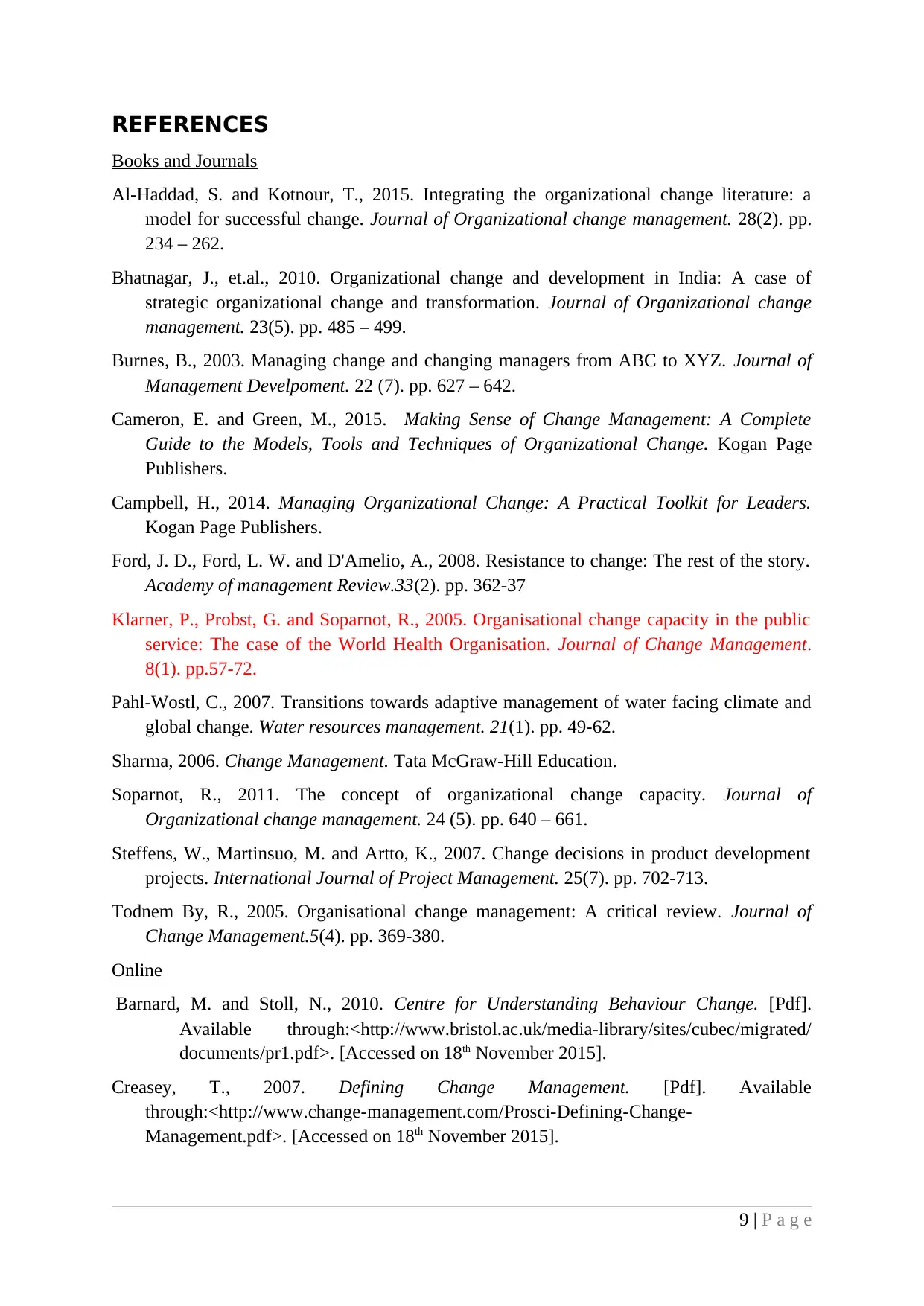
REFERENCES
Books and Journals
Al-Haddad, S. and Kotnour, T., 2015. Integrating the organizational change literature: a
model for successful change. Journal of Organizational change management. 28(2). pp.
234 – 262.
Bhatnagar, J., et.al., 2010. Organizational change and development in India: A case of
strategic organizational change and transformation. Journal of Organizational change
management. 23(5). pp. 485 – 499.
Burnes, B., 2003. Managing change and changing managers from ABC to XYZ. Journal of
Management Develpoment. 22 (7). pp. 627 – 642.
Cameron, E. and Green, M., 2015. Making Sense of Change Management: A Complete
Guide to the Models, Tools and Techniques of Organizational Change. Kogan Page
Publishers.
Campbell, H., 2014. Managing Organizational Change: A Practical Toolkit for Leaders.
Kogan Page Publishers.
Ford, J. D., Ford, L. W. and D'Amelio, A., 2008. Resistance to change: The rest of the story.
Academy of management Review.33(2). pp. 362-37
Klarner, P., Probst, G. and Soparnot, R., 2005. Organisational change capacity in the public
service: The case of the World Health Organisation. Journal of Change Management.
8(1). pp.57-72.
Pahl-Wostl, C., 2007. Transitions towards adaptive management of water facing climate and
global change. Water resources management. 21(1). pp. 49-62.
Sharma, 2006. Change Management. Tata McGraw-Hill Education.
Soparnot, R., 2011. The concept of organizational change capacity. Journal of
Organizational change management. 24 (5). pp. 640 – 661.
Steffens, W., Martinsuo, M. and Artto, K., 2007. Change decisions in product development
projects. International Journal of Project Management. 25(7). pp. 702-713.
Todnem By, R., 2005. Organisational change management: A critical review. Journal of
Change Management.5(4). pp. 369-380.
Online
Barnard, M. and Stoll, N., 2010. Centre for Understanding Behaviour Change. [Pdf].
Available through:<http://www.bristol.ac.uk/media-library/sites/cubec/migrated/
documents/pr1.pdf>. [Accessed on 18th November 2015].
Creasey, T., 2007. Defining Change Management. [Pdf]. Available
through:<http://www.change-management.com/Prosci-Defining-Change-
Management.pdf>. [Accessed on 18th November 2015].
9 | P a g e
Books and Journals
Al-Haddad, S. and Kotnour, T., 2015. Integrating the organizational change literature: a
model for successful change. Journal of Organizational change management. 28(2). pp.
234 – 262.
Bhatnagar, J., et.al., 2010. Organizational change and development in India: A case of
strategic organizational change and transformation. Journal of Organizational change
management. 23(5). pp. 485 – 499.
Burnes, B., 2003. Managing change and changing managers from ABC to XYZ. Journal of
Management Develpoment. 22 (7). pp. 627 – 642.
Cameron, E. and Green, M., 2015. Making Sense of Change Management: A Complete
Guide to the Models, Tools and Techniques of Organizational Change. Kogan Page
Publishers.
Campbell, H., 2014. Managing Organizational Change: A Practical Toolkit for Leaders.
Kogan Page Publishers.
Ford, J. D., Ford, L. W. and D'Amelio, A., 2008. Resistance to change: The rest of the story.
Academy of management Review.33(2). pp. 362-37
Klarner, P., Probst, G. and Soparnot, R., 2005. Organisational change capacity in the public
service: The case of the World Health Organisation. Journal of Change Management.
8(1). pp.57-72.
Pahl-Wostl, C., 2007. Transitions towards adaptive management of water facing climate and
global change. Water resources management. 21(1). pp. 49-62.
Sharma, 2006. Change Management. Tata McGraw-Hill Education.
Soparnot, R., 2011. The concept of organizational change capacity. Journal of
Organizational change management. 24 (5). pp. 640 – 661.
Steffens, W., Martinsuo, M. and Artto, K., 2007. Change decisions in product development
projects. International Journal of Project Management. 25(7). pp. 702-713.
Todnem By, R., 2005. Organisational change management: A critical review. Journal of
Change Management.5(4). pp. 369-380.
Online
Barnard, M. and Stoll, N., 2010. Centre for Understanding Behaviour Change. [Pdf].
Available through:<http://www.bristol.ac.uk/media-library/sites/cubec/migrated/
documents/pr1.pdf>. [Accessed on 18th November 2015].
Creasey, T., 2007. Defining Change Management. [Pdf]. Available
through:<http://www.change-management.com/Prosci-Defining-Change-
Management.pdf>. [Accessed on 18th November 2015].
9 | P a g e

10 | P a g e
⊘ This is a preview!⊘
Do you want full access?
Subscribe today to unlock all pages.

Trusted by 1+ million students worldwide
1 out of 12
Related Documents
Your All-in-One AI-Powered Toolkit for Academic Success.
+13062052269
info@desklib.com
Available 24*7 on WhatsApp / Email
![[object Object]](/_next/static/media/star-bottom.7253800d.svg)
Unlock your academic potential
Copyright © 2020–2026 A2Z Services. All Rights Reserved. Developed and managed by ZUCOL.




